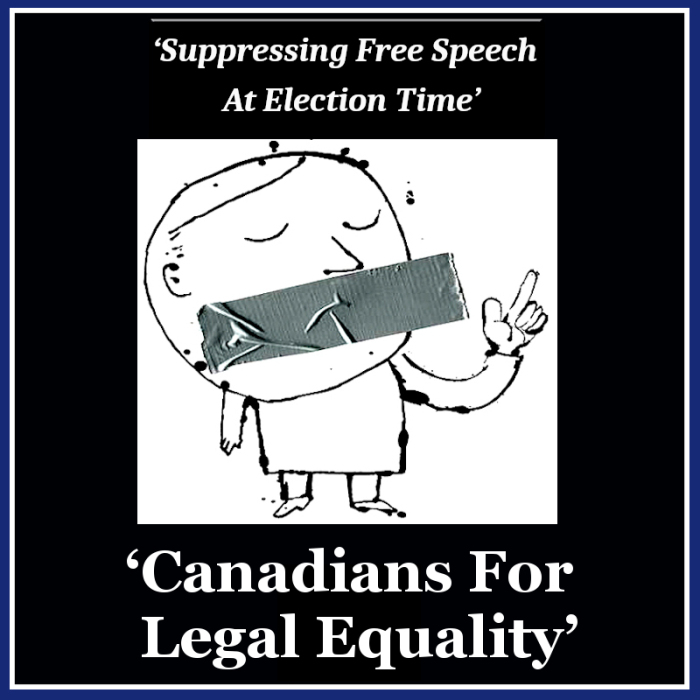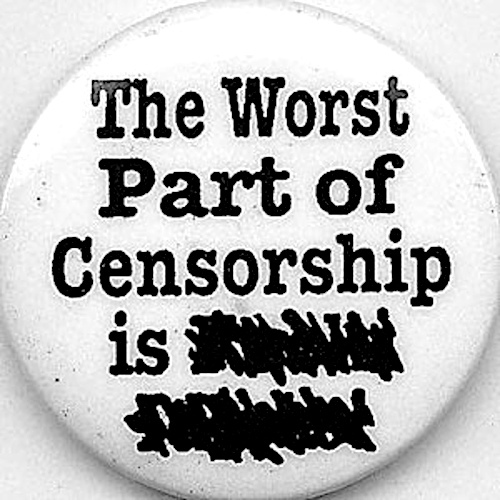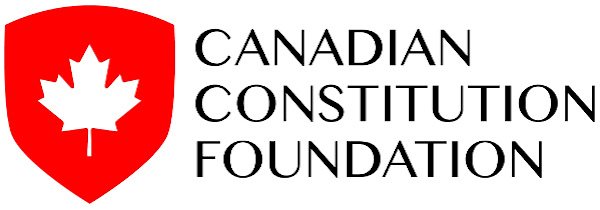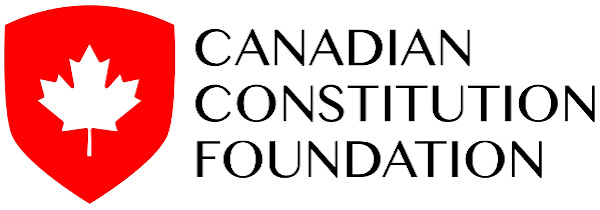“A Canadian civil liberties group has launched an urgent application against the Trudeau government in the name of free speech… The Canadian Constitution Foundation (CCF), a non-partisan charity…
Source: ‘Suppressing Free Speech At Election Time’ – Canadians For Legal Equality
‘Suppressing Free Speech At Election Time’
“A Canadian civil liberties group has launched an urgent application against the Trudeau government in the name of free speech… The Canadian Constitution Foundation (CCF), a non-partisan charity, states in documents prepared for the Ontario Superior Court that the government’s new election law violates the Charter rights of Canadians who wish to voice their opinions in the current election campaign.

“Those who make statements honestly and in good faith are exposed to the risk of imprisonment”,
reads the CCF’s application.“It is a blunt and unrefined instrument that treats sarcastic quips and deliberate lies as one and the same – both are subject to a blanket ban.”
“At question is a revised section of the ‘Canada Elections Act’, first put forward in 2017 by the Trudeau government… The CCF argues that Section 91 of the Act, which can see violators face hefty fines and even jail time, has been made too broad and will chill free speech and democratic participation.
“The previous version of the section of the law focused on banning those who knowingly make false statements about the personal conduct or character of a candidate for office. Now, the section has been expanded to include a wider array of statements made in good faith about a broader category of individuals.
“The new law now bans both false statements claiming “a candidate, a prospective candidate, the leader of a political party or a public figure associated with a political party” have committed an offence or been charged with committing an offence and also bans
“a false statement about the citizenship, place of birth, education, professional qualifications or membership in a group or association of a candidate, a prospective candidate, the leader of a political party or a public figure associated with a political party.”
“One of the supporting affidavits is from Aaron Wudrick, federal director of the Canadian Taxpayers Federation…
“This year, partly out of a fear of the consequence of the amendments to s. 91, we have decided not to purchase Facebook advertisements on federal issues, and have ceased a campaign and disabled a website that focused on politicians that have broken promises to the public”,
Wudrick writes, concerning how Sec. 91 has chilled his organization’s speech.
“Cory Morgan, an outspoken political commentator and activist from Alberta, adds in an affidavit that he fears his social media arguments about how Justin Trudeau has broken the law, and that the former Albert NDP government was colluding with trade unions – which he considers free speech statements – could see him prosecuted under Sec. 91.
“This is an urgent matter”,
writes Joanna Baron, the executive director of the CCF, in another affidavit.
“Canadians should not have to wait until someone who is charged with contravening s. 91 decides to challenge the provision to know whether the restriction it places on free expression is constitutionally sound. By that time, which could be months or years down the road, the damage to free expression during the election period will have already been done.”
“The CCF is represented by Adam Goldenberg, a lawyer with ‘McCarthy Tetrault’ who previously served as chief speechwriter to former ‘Liberal’ leader Michael Ignatieff.
“It will be up to the government, specifically the federal Attorney General, to respond. An application does not carry the same weight as an emergency injunction and as such, it’s not yet clear whether the case will be heard before the Oct. 21 election day.”
–‘Civil liberties group challenges ‘draconian’ Liberal election speech law’,
Anthony Furey, Toronto Sun, September 17, 2019
https://torontosun.com/news/national/civil-liberties-group-challenges-draconian-liberal-election-speech-laws
Feature IMAGE: Miguel Davila
https://nationalpost.com/news/politics/election-2019/marni-soupcoff-voters-dont-need-governments-censoring-their-opinions
 “Imagine a federal law that said you could be imprisoned for up to five years and fined up to $50,000 for saying during this election campaign that Prime Minister Justin Trudeau has broken the law, or is being investigated by the police. Imagine the same thing if you called ‘Conservative’ Leader Andrew Scheer a crook and suggested he belongs in prison. Or if you made a false statement about a politician’s citizenship, place of birth, education, professional qualifications or membership in a group or association.
“Imagine a federal law that said you could be imprisoned for up to five years and fined up to $50,000 for saying during this election campaign that Prime Minister Justin Trudeau has broken the law, or is being investigated by the police. Imagine the same thing if you called ‘Conservative’ Leader Andrew Scheer a crook and suggested he belongs in prison. Or if you made a false statement about a politician’s citizenship, place of birth, education, professional qualifications or membership in a group or association.
“Imagine how full our prisons would be if such a law was rigorously applied, based on statements people are posting on social media every day during the ongoing federal election.
“Except you don’t have to imagine it, because as the ‘Toronto Sun’s Anthony Furey reported exclusively Tuesday {See above}, this law is now on the books in Canada. It was passed last year by the Trudeau government under amendments to the Canada Elections Act concerning the publication of “false statements”.
“The Canadian Constitution Foundation says it’s a clear assault on free speech and is challenging the law as unconstitutional. It has launched an urgent application for a hearing before the Ontario Superior Court.
“Those who make statements honestly and in good faith are exposed to the risk of imprisonment”,
says the CCF’s application.
“It is a blunt and unrefined instrument that treats sarcastic quips and deliberate lies as one and the same — both are subject to a blanket ban.”
“We agree. We already have laws against libel, slander and hate speech.
“This law says in order to register a conviction, the offending statements must be made during an election campaign with the intend to influence its outcome. But the problem is that it makes no allowances for the use of hyperbole, sarcasm, satire, parody and exaggeration, not just on social media but in any public forum discussing politics today.
“A court date has not yet been set for a hearing, but the federal Attorney General, who has not yet responded to the application, has said the government plans to defend the law. We urge the Ontario Superior Court to expedite a hearing on this case and strike down what is clearly a draconian, poorly-worded and overly broad attack on free speech.”
–‘An alarming attack on free speech’,
Toronto Sun, September 18, 2019
https://torontosun.com/opinion/editorials/editorial-an-alarming-attack-on-free-speech

“In our view, this legislation is almost comically in violation of … the Charter guarantee of freedom of expression”,
said the Canadian Constitution Foundation‘s executive director, Joanna Baron.
“Our mandate is to protect constitutional liberties. We think this issue is particularly important because freedom of expression is most important during an election campaign. That’s when we want the most vibrant political speech.”
“The CCF is a libertarian legal charity… The organization’s lawyers have asked for the case to be heard quickly, given that the campaign is already underway, Baron said… Breaking the law could lead to up to five years in prison and a $50,000 fine.
“To violate the law, the statement must be made during the election and with the intent of affecting the election. That might seem like a difficult thing for a prosecutor to prove, but Baron argues it isn’t.
“Our interpretation of this is more or less that all political speech — on social media, particularly, or anywhere else during an election — could be made to be read with the intent to affect the results of an election”,
she says…
“In its filings, the CCF argues that someone might express a good-faith opinion that a political figure had broken the law and end up in prison
“even if the statement was made honestly, in good faith and on reasonable grounds. The same could occur if an individual simply states that a candidate or party leader is a crook.”
“Such claims may be overstated, crude, satirical or sarcastic”,
the filing continues.
“Yet, an individual may consider it necessary to use hyperbole, parody, satire or sarcasm — sometimes in a biting or offensive way — to make a point effectively or to fully express their thoughts, beliefs and opinions.”
“Nothing stops a political figure from suing a critic for defamation, Baron argues.
“We already have protections in our law against speech that incites hateful acts or that is defamatory. This law goes much further than that and casts a broader net”,
she said.“A statement that Justin Trudeau or Andrew Scheer or Jagmeet Singh is a crook, or even, to take an actual example that’s happened, Conservatives alleged on their Twitter page that Justin Trudeau was being investigated by the RCMP — that could be caught by this law.”
“The case was filed in the Ontario Superior Court in Toronto. A hearing has not been scheduled. The federal attorney general, who is named in the suit, has not filed a response but has said ‘it’ will be appearing in court to defend the law.
“Before being amended, the Elections Act forbade knowingly publishing
“any false statement of fact in relation to the personal character or conduct of a candidate or prospective candidate.”
–‘Fake news section of Elections Act faces Charter challenge’,
Patrick Cain, Global News, September 18, 2019
https://globalnews.ca/news/5918877/fake-news-elections-act-free-speech/

Government Lunacy in Canada’ (Gender Bending Speech Enforcement) {June 27, 2017}:
“Forced speech is the most extreme infringement of free speech. It puts words in the mouths of citizens and threatens to punish them if they do not comply. When speech is merely restricted, you can at least keep your thoughts to yourself. Compelled speech makes people say things with which they disagree.”



